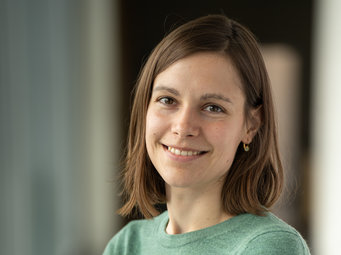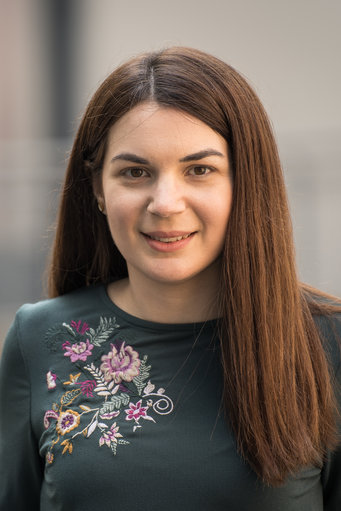Otto Hahn Medals for Maria Samata & Fides Zenk
Two researchers of the MPI of Immunobiology & Epigenetics receive the award for gifted young scientists within the Max Planck Society
Fides Zenk and Maria Samata of the MPI of Immunobiology and Epigenetics each receive the prestigious Otto Hahn Medal. Each year, the prize honors the 30 best young researchers for their outstanding scientific achievements during their Ph.D. in the Max Planck Society. Only very few of them also receive the Otto Hahn Award that enables the awardee to establish its own research group within the Max Planck Society. Maria Samata is one of only two researchers in 2021 who got honored with the Otto Hahn Award 2020.
Doctoral researchers and Postdocs represent by far the largest group of scientists within the Max Planck Society. Their engagement and creativity shape the success of individual research groups, institutes and the Society as a whole. Therefore, the Max Planck Society recognizes its best doctoral researchers for outstanding scientific achievements with the Otto Hahn Medal each year. The award is intended to motivate particularly talented young scientists to pursue a university or research career. This year, two members of the MPI of Immunobiology and Epigenetics will each receive one of the prestigious Otto Hahn Medals.
Epigenetics between the generations

The first medal goes to Fides Zenk, who obtained her Ph.D. in the lab of Nicola Iovino. She receives the award for her groundbreaking work on epigenetic regulation of early embryonic development in Drosophila. During her Ph.D. Fides studied fundamental epigenetic mechanisms that play a significant role in regulating how the DNA is packaged inside the nucleus and control how genes are switched on and off.
It has long been discussed if epigenetic modifications could cross the border of generations and how they could instruct genetic programs in the offspring.
“In my doctoral thesis, I worked on two essential epigenetic processes that govern embryonic development. I could first show that an epigenetic modification transmitted through the maternal germline controls a fine-tuned mechanism required for genome activation during early embryogenesis. Furthermore, I could show that an epigenetic factor is involved in driving and regulating the packaging of DNA inside the nucleus, also in the early embryo”, says Fides Zenk.
Molecular memory for zygotic gene activation

Fruit flies are an excellent model organism to study and understand epigenetic processes. The second MPI-IE graduate and recipient of the 2020 Otto Hahn Medal, Maria Samata, was awarded the prize for her innovative findings into the maternal instructions of an activating histone modification H4K16ac for gene expression of the offspring in flies as well as mice.
Her work under the supervision of Max Planck Director Asifa Akhtar provided unprecedented insights into the epigenetic mark H4K16ac, which is typically associated with the activation of genes. “I could detect it in the oocyte and later in the young embryo during a timeframe in which genes are not yet expressed,” explains Maria Samata. Starting from this contradictory and fascinating observation, Maria revealed that H4K16ac is not only intergenerationally maintained but moreover marks important DNA regions before the onset of their gene activation – turning the molecule into an indispensable instructor during the early developmental stages.
In addition to the Otto Hahn Medal, Maria Samata also receives the Otto Hahn Award that is bestowed by the Max Planck Society to particularly worthy recipients of the Otto Hahn Medal. In 2021, only two awards are granted. The prize gives recipients the rare opportunity to start their own research group within the Max Planck Society and is intended to pave the way for a long-term scientific career in Germany. “I was very pleasantly surprised to receive the Otto Hahn Medal and on top of this the Otto Hahn Award. I am honoured that my PhD work was recognized by the Max Planck Society,” says Maria Samata.
The Award ceremony of the Otto Hahn medals and the Otto Hahn Award takes place on the occasion of the 2021 Annual Meeting of the Max Planck Society.
Congratulation, Fides and Maria, on these awards!
CVs
Fides Zenk
Prior to her doctoral studies at the International Max Planck Research School for Molecular and Cellular Biology (IMPRS-MCB now IMPRS-IEM) in the lab of Nicola Iovino, Fides completed a BSc and MSc in Biology at the University of Kassel (Germany). In 2020, she became a Postdoc in the lab of Barbara Treutlein at the ETH Zürich (Switzerland). In 2020, Fides received the Elisabeth Gateff Prize by the German Genetics Society.
Maria Samata
Maria obtained a BSc in Biology at the University of Crete (Greece), where she also completed her MSc in Developmental Biology. In 2015, she joined the International Max Planck Research School for Molecular and Cellular Biology in Freiburg (IMPRS-MCB now IMPRS-IEM) at the Department of Chromatin Regulation led by the director Asifa Akhtar.
Otto Hahn Medals
The Max Planck Society honors up to 30 young scientists and researchers each year with the Otto Hahn Medal for outstanding scientific achievements. The award comes with a monetary sum of 7500 euros and is intended to motivate especially gifted junior scientists and researchers to pursue a future university or research career. The award is named after the German chemist and Nobel laureate Otto Hahn (1879-1968), who was president of the MPG from 1948 to 1960. Since 1978, more than 1000 scientists and researchers have been awarded the Otto Hahn Medal.
Otto Hahn Award
Only a small number of recipients of the Otto Hahn Medal are additionally honored with the Otto Hahn Award each year and get the opportunity by the Max Planck Society, following on from a stay abroad, to head a small research group (formerly Otto Hahn Groups) at a Max Planck Institute of their choice. The group leader is free to design a research project thus enabling him or her to continue his or her career in Germany.













